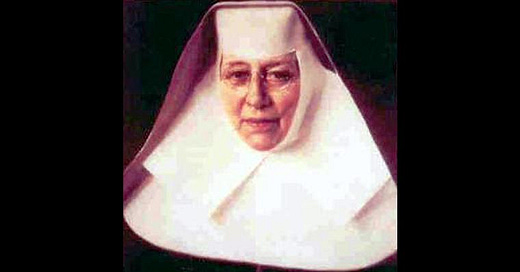Today is the feast of St. Katharine Drexel. Born in Philadelphia in 1858, Katharine Drexel founded the Sisters of the Blessed Sacrament, a congregation of missionary nuns dedicated to the welfare of American Indians and African Americans.
Katharine came from a wealthy Philadelphia family. Her father, Francis Anthony Drexel, was a financier and philanthropist. One of her uncles founded Drexel University and another founded Lankenau Hospital. Her mother, Hannah Langstroth, died when Katherine was 5 weeks old. Katharine’s father married Emma Bouvier in 1860. Both Katherine’s father and step-mother stressed the importance of using their wealth and good fortune to help others.
Katharine’s father made sure that his daughters were aware of the unjust disparity between the races. Family trips included visits to Native American lands so that the girls could witness these injustices for themselves.
Three days a week, Emma Bouvier distributed food, clothing, medicine, and rent assistance from their family home on Walnut Street. Once the Drexel sisters were old enough, they assisted her.
According to Emma Drexel, "kindness may be unkind if it leaves a sting behind." So when the family heard that someone in need was too proud or unable to come to the family home for help, they sought them out.
Emma Drexel suffered with cancer for three years before dying. Witnessing her step-mother’s suffering and death awakened a new seriousness in Katharine. She’d been interested in the struggles of Native Americans ever since she read Helen Hunt Jackson’s A Century of Dishonor. On a 1884 family trip out West, she saw the plight of Native Americans first hand. Vowing to do what she could to alleviate their suffering, Katharine began to provide personal and financial support to numerous missions and missionaries in the United States.
When Katharine’s father died in 1885, she and her two sisters inherited $14 million between them. Their father, concerned that his daughters would be prey to “fortune hunters,” set up his will so that Katharine and her sisters controlled the income from his estates. The sisters continued the family tradition of helping those in need. They founded schools for orphans, set up institutions to aid the education and upward mobility of African Americans, and contributed money to help Native Americans, among other good works.
"Miss Drexel Enters a Catholic Convent—Gives Up Seven Million."
On an 1887 trip to Rome, during a private audience with Pope Leo XIII, Katharine and her sisters asked the pope to staff some of the Native American missions they’d been supporting financially. Pope Leo turned to Katharine and suggested that she staff the missions herself by becoming a missionary. Eventually, she did just that, devoting herself and her inheritance in service to God by helping Native Americans and African Americans.
Initially, Katharine thought she would join a contemplative order, but Bishop O’Connor, a family friend, her spiritual advisor, and bishop of Nebraska advised her to found a missionary order to assist Native Americans and African Americans. In response to his directive, Katharine wrote to him:
“I know the privations, the trials, the temptations, and I ask myself, could I go through all these things in a manner suitable for edifying the religious of my order?”
Bishop O’Connor replied, “I was never so sure of any vocation, not even my own, as I am of yours. If you do not establish the order in question, you will allow to pass an opportunity of doing immense service to the Church which may not occur again.”
In 1891, she professed her first vows, taking the name Mother Katharine, and formed the Sisters of the Blessed Sacrament.
Mother Katharine established 145 missions, 50 schools for African Americans, and 12 schools for Native Americans. She founded the New Orleans High School that eventually became Xavier University of Louisiana, the only historically black Catholic college in the US.
On March 3, 1955, at the age of 96, Mother Katharine Drexel died. She was buried at the order’s motherhouse until 2017 when her remains were removed to the Cathedral Basilica of St. Peter and Paul in Center City Philadelphia.
At her canonization on Oct. 1, 2000, Pope John Paul II highlighted her fourfold legacy:
A love of the Eucharist and perspective on the unity of all peoples;
Courage and initiative in addressing social inequality among minorities;
Efforts to achieve quality education for all; and
Selfless service, including the donation of her inheritance, for the victims of injustice.



